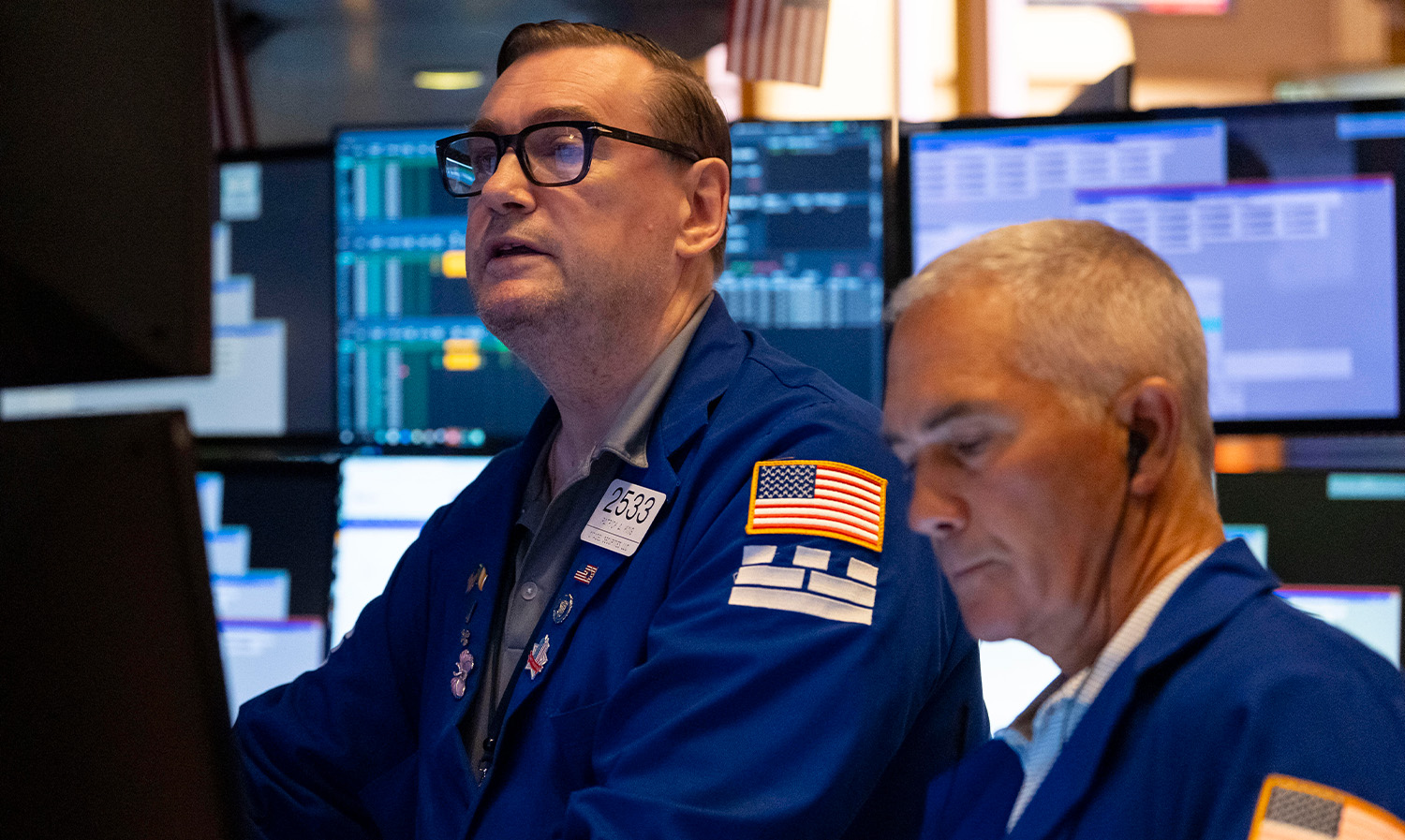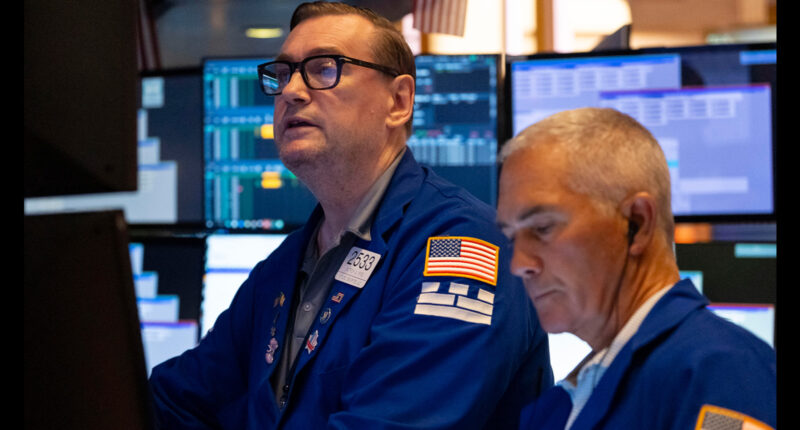Share this @internewscast.com
Stocks are drifting in mixed trading on Wall Street Thursday after President Donald Trump’s latest tariffs took effect on dozens of countries.
The S&P 500 dipped by 0.1% after initially climbing towards its record high set just last month. Meanwhile, the Dow Jones Industrial Average dropped 330 points, or 0.7%, as of 11:45 a.m. Eastern time, and the Nasdaq Composite saw a 0.4% increase.
Concerns remain elevated regarding the impact of Trump’s tariffs on the economy, especially following last week’s disappointing job market report. However, expectations for potential interest rate cuts by the Federal Reserve, combined with a series of stronger-than-anticipated earnings reports from major U.S. companies, are currently helping to balance these worries. Lower interest rates can stimulate the economy and raise investment values, but there is a risk they may also lead to increased inflation.

Traders work on the floor of the New York Stock Exchange, Friday, Aug. 1, 2025, in New York.
AP Photo/Yuki Iwamura
The Bank of England cut its main interest rate on Thursday in hopes of bolstering the sluggish U.K. economy.
The tariffs implemented by the U.S. on Thursday morning were anticipated and are less severe than initially threatened by Trump. Some nations are still in talks to reduce the tax rates on their exports, with continued uncertainty seemingly the only constant in the financial markets. At the same time, critics argue the U.S. stock market has surged too rapidly since its low in April, resulting in potentially overvalued prices.
The latest reports on the U.S. economy came in mixed, meanwhile, which left Treasury yields relatively stable in the bond market.
One report indicated a slight rise in the number of Americans applying for unemployment benefits last week, a potential signal of increasing layoffs, although the figures remain within recent norms.
“There is nothing to see here!” according to Carl Weinberg, chief economist at High Frequency Economics. “These are not nearly recession readings.”
Another report highlighted that U.S. worker productivity in the spring exceeded economists’ forecasts, which could foster economic growth without exacerbating inflation pressures. This is particularly significant as Trump’s tariffs appear likely to raise costs on a variety of goods purchased by American households and businesses.
On Wall Street, Apple’s influence contributed to the market’s gains amid expectations that its substantial size will enable it to navigate the economic landscape shaped by Trump’s policies. Apple shares rose 3% following CEO Tim Cook’s visit to the White House on Wednesday, where he announced a $100 billion increase in the company’s U.S. manufacturing investment over the upcoming four years.
Trump also announced a 100% tariff on imported computer chips, but he added “if you’re building in the United States of America, there’s no charge.”
“Large, cash-rich companies that can afford to build in America will be the ones to benefit the most,” said Brian Jacobsen, chief economist at Annex Wealth Management. “It’s survival of the biggest.”
DoorDash climbed 4.8% after the delivery app topped Wall Street’s profit expectations for the latest quarter. It attracted new customers and saw the total number of orders increase.
Duolingo, the language-learning app, soared 28.9% after it crushed Wall Street’s expectations. The company said its subscription revenue grew 46% over the same period last year.
They helped offset a drop for Eli Lilly, which fell 14.7% even though the drugmaker reported a stronger profit for the latest quarter than analysts expected. Analysts said some investors were disappointed with results that Lilly provided for a late-stage study of its potential pill version of the popular weight-loss drug Zepbound.
Intel sank 3% after Trump called for its CEO to resign, while accusing him of being “highly CONFLICTED,” though he gave no evidence.
Crocs tumbled 25.2% even though the footwear company reported a stronger profit for the latest quarter than analysts expected. It said it expects revenue to fall between 9% and 11% in the current quarter from a year earlier, while tariffs are dragging on its profitability. The company cited “continued uncertainty from evolving global trade policy and related pressures around the consumer.”
In stock markets abroad, indexes rose across much of Europe and Asia.
Stocks climbed 0.2% in Shanghai and 0.7% in Hong Kong after China reported that its exports picked up in July, helped by a flurry of shipments as businesses took advantage of a pause in Trump’s tariff war with Beijing.
Japan’s Nikkei 225 rose 0.6%. Toyota Motor’s stock fell after it cut its full-year earnings forecasts largely because of President Donald Trump’s tariffs, but Sony rose after the entertainment and electronics company indicated it’s taking less damage from the tariffs than it had expected.
In the bond market, the yield on the 10-year Treasury remained at 4.22%, where it was late Wednesday.
Copyright © 2025 by The Associated Press. All Rights Reserved.

















